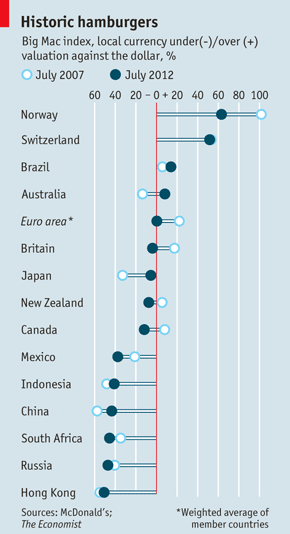(单词翻译:单击)
经济学人原文Finance and Economics;The Big Mac index;Calories and currencies;
财经;巨无霸指数;货币卡路里;
What burgernomics says about five years of turmoil
汉堡经济学解读“危机五年”
Our Big Mac index is back. Normally a beefy bundle of exchange rate fun, this year it is marking a sombre anniversary: five years since global money-markets seized up in the summer of 2007. What does burgernomics reveal about today's exchange rates, and about the impact that five years of distress, from credit crunch to euro crisis, have had on currencies?
《经济学人》的巨无霸指数又回来啦!与往常拿厚厚一叠汇率开玩笑不同,今年是为了黯然纪念“2007年夏全球金融市场失灵”五周年。汉堡经济学该如何解读现今的汇率形势,以及五年混乱——从信贷紧缩到欧元危机对货币的影响?

The Big Mac index is The Economist's burger-based measure of whether currencies are over- or undervalued. The recipe comes from the theory of purchasing-power parity, which says that exchange rates should eventually adjust to make the price of a basket of goods the same in each country. Our basket contains just one item: the Big Mac hamburger, which is pretty much the same around the world.
巨无霸指数是《经济学人》以汉堡价格为基础来衡量一国货币是否被高估或低估。其理论依据是购买力评价学说,该学说认为应使汇率最终调整到使各国一篮子商品的价格相同。《经济学人》的篮子里只有一样商品:巨无霸汉堡,该商品在全世界卖的几乎是一样的。
The index works by calculating the exchange rate that would leave a Big Mac costing the same in each country. Take the rouble and the real, the currencies of Russia and Brazil respectively. At current exchange rates a Big Mac, which sells for 4.33 dollor in America, costs just 2.29 dollor (75 roubles) in Russia, whereas in Brazil it sells for a sliver under 5 (10 reais) dollor. So the dollar buys a lot of burger in Russia, signalling that the rouble is cheap and the real rather pricey. A selection of other currencies is included in the chart (the full index can be seen here).
巨无霸指数的作用在于计算出使各国汉堡价格相同的汇率。以俄罗斯货币卢布和巴西货币雷亚尔为例。在当前汇率下,一个巨无霸在美国售价为4.33美元,在俄罗斯仅售2.29美元(75卢布),然而巴西的售价略低于5美元(10雷亚尔)。所以美元在俄罗斯可以买到许多汉堡,这说明卢布比较便宜而雷亚尔相当昂贵。该图表显示了其他代表性货币情况(要看完整的巨无霸指数请点这里)
In addition to the real, several other currencies look dear, according to the latest Mcdata. A group of rich European countries—none of them in the euro zone—sit near the top of the pile. At the other end, the yen, the pound and the Canadian dollar all look cheap. But it is in Asia that you get the most burger for your buck: China, Indonesia and Hong Kong are all more than 40% undervalued.
根据美国麦迪数据公司最新数据显示,除了雷亚尔,其他几种货币也表现得昂贵。一批富裕的欧洲国家——都没有加入欧元区——处在排行的前列。另一端,日元、英镑、以及加拿大元都表现的廉价。然而在亚洲买汉堡才是最划算:中国、印度尼西亚、和中国香港的货币都低估了40%以上。
There have been some big shifts in fortune since the first rumblings of the crisis, five years ago. The Australian dollar has strengthened, moving from 14% undervalued to 8% overvalued. In the early part of the crisis Australia's well-capitalised banks proved remarkably resilient; more recently, the currency has benefited from a spike in commodities prices (see article), and from strong exports to China. Japan and Brazil also have beefier currencies than five years ago.
自五年前经济危机伊始,全球财富进行了一些大洗牌。澳元走强,从低估40%升至高估8%。在危机早期,澳洲资本雄厚的银行显著地证明了自己具有弹性。最近,澳元又受益于大宗商品价格飙升,以及对中国强劲的出口。日本和巴西的货币也比五年前更坚挺。
Others have weakened. The British pound is a shadow of its former self: since 2007 it has moved from 18% overvalued to 4% undervalued. Britain's experience has been the opposite of Australia's: its financial industry, a big chunk of the overall economy, was at the heart of the financial turmoil (the pound depreciated sharply in 2008) and its biggest export market, the euro zone, is in a dreadful mess.
其他货币则变得疲软。英镑沦落为从前自己的影子:自2007年起从高估18%跌落至低估4%。英国的经历恰与澳大利亚相反:占英国总体经济大部分的金融业处于金融风暴的中心(2008年英镑急剧贬值),而它最大的出口市场欧元区正一团糟。
Being at the bottom of the Big Mac index need not be all bad, though. A cheap currency means exports look attractive to foreigners. Slipping down the index should, in theory, boost net exports. China manages its currency using exactly this logic: to keep the yuan cheap and demand for yuan-priced exports high.
不过处在巨无霸指数的底部也不全是坏事。便宜的货币意味着出口在外国人眼里更有吸引力。理论上,巨无霸指数上的下滑可以促进净出口。中国对人民币的管制正是出于这一逻辑:保持人民币价格低,就可以保证以人民币计价的出口需求大。
Now the biggest exchange rate move economists are hoping to see is a marked fall in the value of the euro. The euro zone, in particular its sickly peripheral economies, including Spain and Greece, craves a calorific boost from the currency.
如今经济学家期望看到的最大汇率变动是欧元价值的显著下滑。欧元区,特别是糟糕的外围经济体(包括西班牙和希腊)渴望货币能释放巨大能量,来推动经济复苏。
讲解
1.The Big Mac index 巨无霸指数
提到巨无霸指数,就先要了解一价定律(Law of One Price)。该定律认为假定商品在国家之间不存在运输成本,也不存在贸易壁垒(如关税),那么在任何国家,同一种商品的价格应该是一致的。
一价定律是个严谨的概念,巨无霸指数是一个较为流行的术语。这种指数可以用来粗略估计,相对于美元哪种货币被低估,哪种货币被高估。
2.购买力平价学说(the theory of purchasing-power parity,PPP):
在长期内,国家之间相对价格水平的变化决定了汇率的变化。根据该原理,一种货币的汇率升值或贬值的幅度与本国和外国之间的通货膨胀率差值相等。
3.get the most burger for your buck
有句美国俚语是bang for the buck,意思是花最少钱得到最大的效果,也就是合算,划算的意思。
这里显然是将bang换成了burger,意思是花最少的钱买到最多的汉堡。


